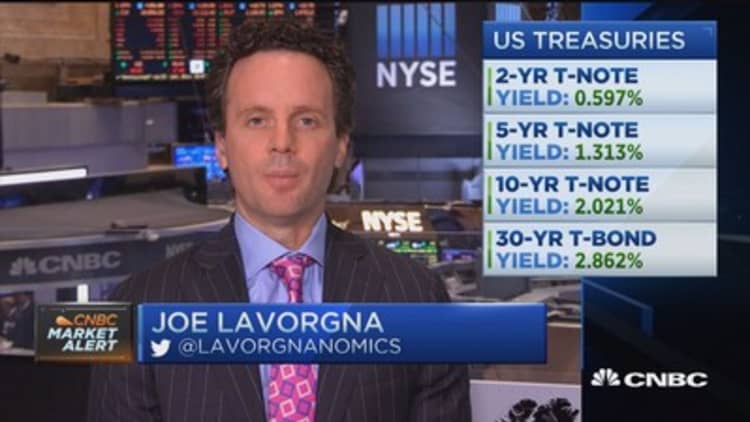
Stock markets are rallying because investors believe the Federal Reserve has their backs after last week's disappointing jobs report, Deutsche Bank's Joseph LaVorgna said Monday.
Central bankers are essentially stuck now that investors are expecting the Fed to keep its benchmark federal funds rate near zero in the face of weaker labor market data, he said.
"The Fed is very naïve to believe that it could actually raise rates if the market is not discounting it," Deutsche's chief U.S. economist told "Squawk on the Street."
Earlier Monday, Komal Sri-Kumar, president of Sri-Kumar Global Strategies, told CNBC's "Squawk Box" an interest rate hike at a time when investors are not expecting one could result in a "major shock" because investors would have to reverse their positions.
Read MoreFed is now 'abject follower of the market': Sri-Kumar
Fed funds futures prices currently suggest there is little probability of an October or December move, LaVorgna said. For that to change, he added, economic data will need to be very strong in the remaining weeks of 2015, or the Fed must "forcefully" tell markets it will raise rates.
Central bankers have now missed their window to raise interest rates, he said, insisting they should have done so earlier this year when job creation was more robust.
Friday's nonfarm payrolls report showed job creation averaged 167,000 over the last three months, slowing from the 260,000-per-month clip for all of 2014. At the beginning of the year, the three-month average was 312,000.
Read More Why the jobs picture is even worse than you think
Which sectors of the market will perform best between now and year's end will depend on whether or not the Fed raises rates, said David Lebovitz, global market strategist at JPMorgan Asset Management.
Easy monetary policy would probably continue to be supportive of defensive sectors — which include utilities, health care and consumer staples — he said. Many of those stocks issue dividends that act as a substitute for bond yields.
However, a pickup in economic activity could support some cyclical sectors, Lebovitz said.
"We do think we'll see some strength in the fourth quarter, stronger than what we saw in the third quarter," he told "Squawk on the Street."
—CNBC's Jeff Cox contributed to this story.


